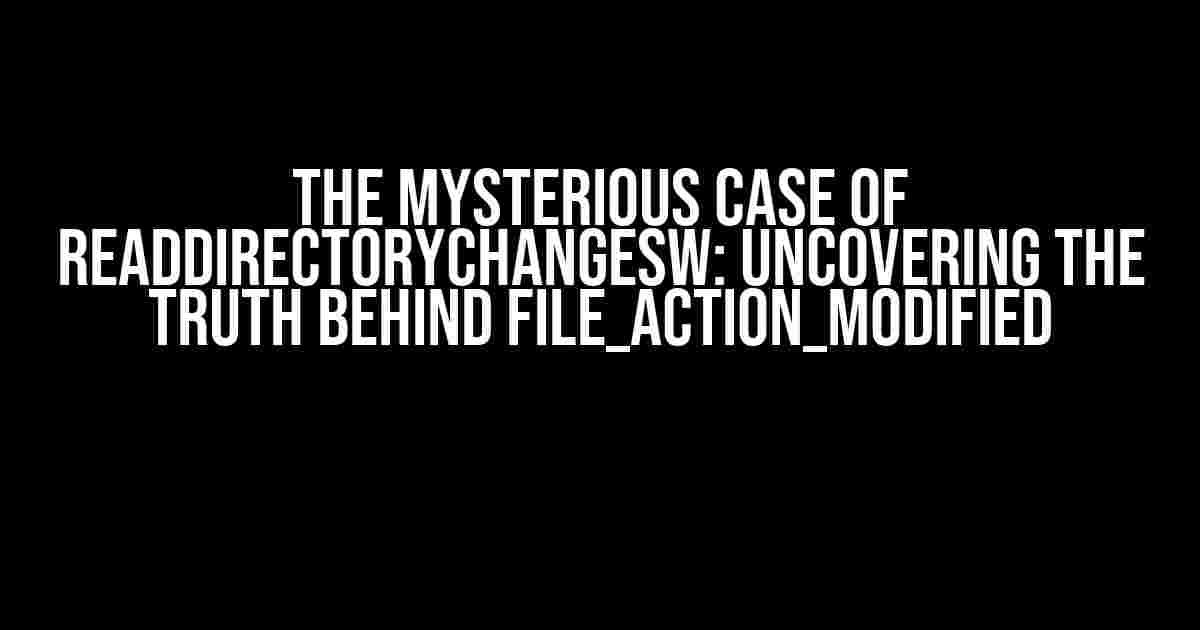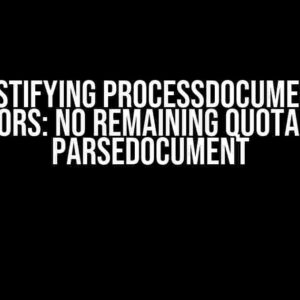Are you tired of banging your head against the wall, trying to figure out why ReadDirectoryChangesW isn’t sending immediate FILE_ACTION_MODIFIED notifications on file writes? You’re not alone! In this article, we’ll delve into the mysteries of ReadDirectoryChangesW and uncover the secrets behind its seemingly strange behavior. Buckle up, folks, and let’s get started!
What is ReadDirectoryChangesW?
ReadDirectoryChangesW is a Windows API that allows your application to monitor changes to a directory. It’s a powerful tool that can notify your application of file creations, deletions, modifications, and more. Sounds simple, right? Well, as it turns out, there’s more to it than meets the eye.
The FILE_ACTION_MODIFIED Conundrum
So, you’ve set up ReadDirectoryChangesW to monitor a directory, and you’re expecting to receive a FILE_ACTION_MODIFIED notification whenever a file is modified. But, for some reason, the notification doesn’t come immediately. Instead, you have to wait until the file handle is closed or opened again. What’s going on?
The answer lies in how Windows handles file modifications. When a file is modified, the operating system doesn’t immediately update the file’s metadata. Instead, it caches the changes in memory, and only writes them to disk when the file handle is closed or flushed. This is known as “lazy writing.”
ReadDirectoryChangesW relies on the file system to notify it of changes. However, since the file system doesn’t immediately update the file’s metadata, ReadDirectoryChangesW doesn’t receive the FILE_ACTION_MODIFIED notification until the file handle is closed or opened again. This is why you’re not seeing immediate notifications.
Solving the Problem: Strategies for Immediate Notifications
Now that we understand the root cause of the issue, let’s explore some strategies to get immediate FILE_ACTION_MODIFIED notifications.
1. Using FILE_NOTIFY_CHANGE_LAST_WRITE
One solution is to use the FILE_NOTIFY_CHANGE_LAST_WRITE flag when calling ReadDirectoryChangesW. This flag tells the operating system to notify your application whenever a file’s last write time changes. This will give you more immediate notifications, but it has its limitations.
DWORD dwNotifyFilter = FILE_NOTIFY_CHANGE_LAST_WRITE;
HANDLE hDir = CreateFile(
"C:\\Path\\To\\Directory",
GENERIC_READ | GENERIC_WRITE,
FILE_SHARE_DELETE | FILE_SHARE_READ | FILE_SHARE_WRITE,
NULL,
OPEN_EXISTING,
FILE_FLAG_BACKUP_SEMANTICS,
NULL
);
ReadDirectoryChangesW(
hDir,
NULL,
0,
TRUE,
dwNotifyFilter,
NULL,
NULL,
NULL
);
2. Implementing a File Watcher
Another approach is to implement a file watcher that periodically checks the file system for changes. This can be done using the FindFirstFile and FindNextFile functions to iterate through the directory and check file timestamps.
HANDLE hFind = INVALID_HANDLE_VALUE;
WIN32_FIND_DATA fileData;
hFind = FindFirstFile(
"C:\\Path\\To\\Directory\\*",
&fileData
);
if (hFind == INVALID_HANDLE_VALUE)
{
// Handle error
}
do
{
// Check file timestamp
FILETIME ftWrite = fileData.ftLastWriteTime;
// Store the timestamp for later comparison
} while (FindNextFile(hFind, &fileData));
FindClose(hFind);
3. Using a Third-Party Library
If you’re not keen on implementing a file watcher from scratch, you can use a third-party library that provides real-time file system monitoring. These libraries often use more advanced techniques, such as kernel-mode drivers, to provide immediate notifications.
Some popular libraries for file system monitoring include:
- ReadDirectoryChangesWNET
- FileSystemWatcher.NET
- DirectoryMonitor
Best Practices for Using ReadDirectoryChangesW
Now that we’ve explored strategies for getting immediate FILE_ACTION_MODIFIED notifications, let’s discuss some best practices for using ReadDirectoryChangesW.
1. Use the Correct Flags
Make sure to use the correct flags when calling ReadDirectoryChangesW. The most important flags are:
- FILE_NOTIFY_CHANGE_FILE_NAME
- FILE_NOTIFY_CHANGE_DIR_NAME
- FILE_NOTIFY_CHANGE_ATTRIBUTES
- FILE_NOTIFY_CHANGE_SIZE
- FILE_NOTIFY_CHANGE_LAST_WRITE
- FILE_NOTIFY_CHANGE_LAST_ACCESS
- FILE_NOTIFY_CHANGE_CREATION
- FILE_NOTIFY_CHANGE_SECURITY
These flags will determine what types of changes will trigger a notification.
2. Handle Errors Correctly
Error handling is crucial when working with ReadDirectoryChangesW. Make sure to check the return value of the function and handle errors accordingly.
if (ReadDirectoryChangesW(...) == FALSE)
{
DWORD dwError = GetLastError();
// Handle error
}
3. Use a Separate Thread
ReadDirectoryChangesW can block the calling thread, so it’s recommended to use a separate thread to call the function. This will prevent your application from freezing or becoming unresponsive.
4. Monitor the Correct Directory
Make sure to monitor the correct directory. If you’re monitoring a subdirectory, you may not receive notifications for changes in the parent directory.
Conclusion
In conclusion, ReadDirectoryChangesW can be a powerful tool for monitoring directory changes, but it requires a deep understanding of how it works. By using the correct flags, handling errors correctly, and using a separate thread, you can get the most out of this API. Additionally, by implementing a file watcher or using a third-party library, you can get immediate FILE_ACTION_MODIFIED notifications.
Remember, understanding the underlying mechanics of file system monitoring is key to successfully using ReadDirectoryChangesW. With this knowledge, you’ll be well on your way to creating a robust and efficient file system monitoring system.
| Flag | Description |
|---|---|
| FILE_NOTIFY_CHANGE_FILE_NAME | Notify of file name changes |
| FILE_NOTIFY_CHANGE_DIR_NAME | Notify of directory name changes |
| FILE_NOTIFY_CHANGE_ATTRIBUTES | Notify of file attribute changes |
| FILE_NOTIFY_CHANGE_SIZE | Notify of file size changes |
| FILE_NOTIFY_CHANGE_LAST_WRITE | Notify of file last write time changes |
| FILE_NOTIFY_CHANGE_LAST_ACCESS | Notify of file last access time changes |
| FILE_NOTIFY_CHANGE_CREATION | Notify of file creation |
| FILE_NOTIFY_CHANGE_SECURITY | Notify of file security changes |
By following these best practices and strategies, you’ll be able to create a robust and efficient file system monitoring system that meets your needs.
Frequently Asked Question
Get the inside scoop on ReadDirectoryChangesW and its quirks!
Why doesn’t ReadDirectoryChangesW immediately return FILE_ACTION_MODIFIED when a file is written to?
ReadDirectoryChangesW is a bit of a rebel, it doesn’t play by the rules. When a file is written to, it doesn’t immediately trigger a FILE_ACTION_MODIFIED notification. Instead, it waits for the file handle to be closed or reopened. This is because the operating system caches file changes in memory before committing them to disk. ReadDirectoryChangesW only returns notifications when the operating system flushes these changes to disk, which usually happens when the file handle is closed or reopened.
Is there a way to force ReadDirectoryChangesW to return FILE_ACTION_MODIFIED immediately after a write operation?
The short answer is no, there’s no way to force ReadDirectoryChangesW to return FILE_ACTION_MODIFIED immediately after a write operation. However, you can try calling FlushFileBuffers on the file handle after writing to it. This might increase the chances of ReadDirectoryChangesW returning a FILE_ACTION_MODIFIED notification sooner, but it’s not guaranteed.
Why does ReadDirectoryChangesW wait for the file handle to be closed or reopened?
This is because ReadDirectoryChangesW is designed to work with the operating system’s file caching mechanism. When a file is written to, the changes are cached in memory until the file handle is closed or reopened. ReadDirectoryChangesW is notified when the operating system flushes these cached changes to disk, which usually happens when the file handle is closed or reopened. This ensures that ReadDirectoryChangesW only returns notifications when the file changes are persisted on disk.
How can I work around the limitations of ReadDirectoryChangesW?
One way to work around the limitations of ReadDirectoryChangesW is to use additional mechanisms to detect file changes. For example, you can use a separate thread to periodically scan the directory for changes, or use a file watcher API like ReadDirectoryChangesEx or WaitForMultipleObjects. You can also try using other file monitoring APIs like IFileChangeWatcher or FileSystemWatcher. Each approach has its pros and cons, so choose the one that best fits your use case.
Are there any alternative APIs that can provide more timely file change notifications?
Yes, there are alternative APIs that can provide more timely file change notifications. For example, the ReadDirectoryChangesEx API is similar to ReadDirectoryChangesW but provides more detailed notifications and can return FILE_ACTION_MODIFIED notifications more promptly. Another option is to use the IFileChangeWatcher API, which provides a more comprehensive file monitoring mechanism. On .NET, you can use the FileSystemWatcher class, which provides a handy way to monitor file system changes.


